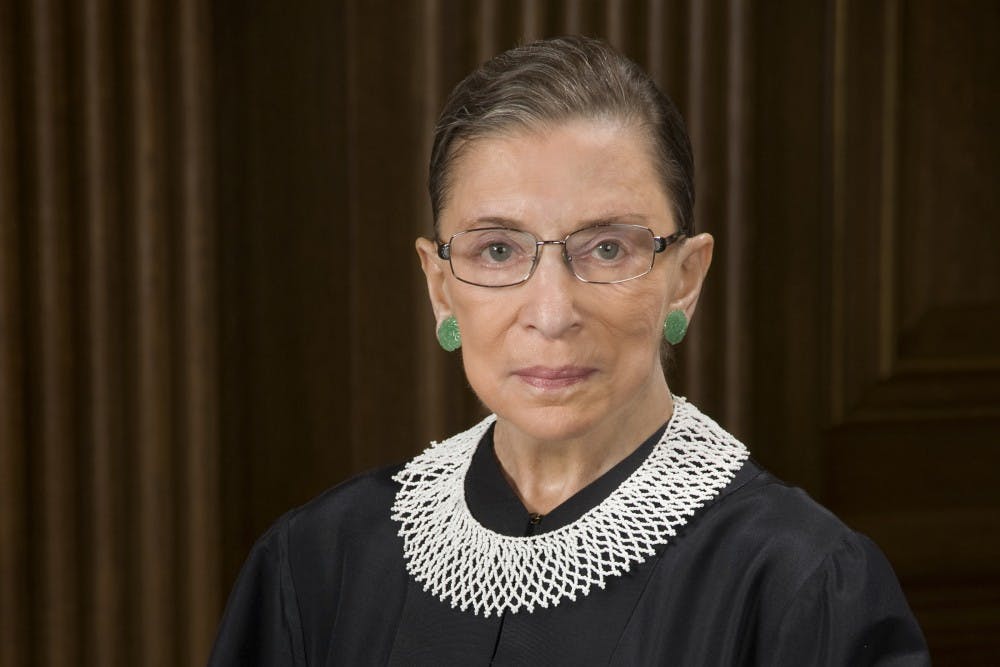Justice Ruth Bader Ginsburg is undeniably one of the greatest jurists of our time, and her declining health is mournful in its own right. However, everytime Ginsburg falls, or so much as sneezes, liberals collectively hold their breath. Citizens of all colors and stripes fear that if Ginsburg were to pass before the end of President Donald Trump’s term her seat on the Supreme Court would be filled by a judge antithetical to to what she has fought for her entire life. If Ginsburg passes in one year versus 3 the effect on equal rights, partisan gerrymandering and even healthcare, could be markedly different, given the Supreme Court’s role in determining the legality of public policy.
The direction of our country should not rely so heavily on one person's life span. The hysteria over Ginsburg’s health reveals systemic issues with the current structure of the Supreme Court. The Supreme Court battles of the past decade must be de-escalated — term limits should be placed on Supreme Court justices.
The Supreme Court has always been an undemocratic institution — cameras are not allowed in the courtroom, justices can essentially serve on the court for life and it is extremely difficult to to overturn a decision handed down by the Court — their rulings can only be overturned by a constitutional amendment or a later decision. In other words there is insufficient transparency, little accountability and weak checks and balances.
The branch of government that was designed to be a fair arbitrator of constitutional questions has morphed into a quasi-legislative branch that is subject to the intense partisan fighting of every other branch. One only has to look at the nominations of Robert Bork, Clarence Thomas, and Brett Kavanaugh to see that the process has broken down.
Many of these problems start with the awful concept of lifetime tenure. The quirks of lifetime tenure have lead to increasingly younger candidates being nominated, and the ability for these justices to influence the country for 40 plus years, far after the cultural and political moment that got them nominated has passed. For this reason the Supreme Court can lag behind the cultural curve and hold up social and political movements that have long since earned their due. In the 1930s the public overwhelmingly supported the New Deal, yet in 1935 the Supreme Court invalidated a centerpiece of President Franklin Roosevelt's plan. This could have been due to the fact that many members of the Supreme Court were appointed in the 1910s and 20s far before the Great Depression, making their mindset out of step with what the public desired and needed.
Furthermore, lifetime tenure and increasingly bitter nomination struggles have created the perverse incentive to pick youth over experience. Great legal minds have been appointed to the Court over the years, and by no means are any of the current justices unfit to serve purely on an intellectual basis. Yet, the current environment has created an incentive for presidents to opt for a young judge with as little of a paper trail as possible, rather than more experienced minds with a long history of opinions. The largest roadblock to Kavanaugh’s confirmation was originally believed to be his lengthy paper trail of legal documents. When Merrick Garland was initially nominated some “analysts” stated it was a strength that he did not have a past opinion on abortion, that he would benefit from his own ambiguity on the issue. However, the lack of a clear well defined stance hurts American democracy, because in a sense Americans are buying a product without knowing what’s inside. Americans deserve to have nominees to the Supreme Court with lengthy track records, to understand what each justice believes.
There are many issues that need to be worked out, and no one proposal will fix every problem, yet one that would dramatically help would be a constitutional amendment that limits the tenure of a Supreme Court justice to 18 years and includes language ensuring a nominee’s consideration by the Senate with an up or down vote.
Having well defined term limits will decrease the tension in nomination fights as each president will be ensured two nominations per term and the justice nominated will not serve for decades. Introducing term limits will also enable presidents to consider older candidates, with a more extensive record, who would only need to serve 18 years. Additionally, a mandatory up or down vote on a nominee would ensure the Senate’s review and consideration, neither party would be able to stonewall a confirmation simply because a president is near the end of his term. Thankfully, liberals and conservatives will no longer have to offer to donate ribs every time their favorite judge goes to the hospital, as the fate of one third of the government will not rest on the lifespan of one person.
Most importantly, term limits will make the Supreme Court a more democratic institution, as justices would better represent the cultural era that they serve in — justices appointed in the 90s with a mindset from the 80s would no longer decide cases in 2010.
If there is one thing that both liberals and conservatives can agree on it is that Neil Gorsuch and Garland’s confirmation battles were both partisan struggles decided not by qualifications alone, but by a red versus blue mentality. Americans should strive for more, and the best step forward is to mandate term limits for Supreme Court justices.
Matthew Baker is an Opinion Columnist for The Cavalier Daily. He can be reached at opinion@cavalierdaily.com.





